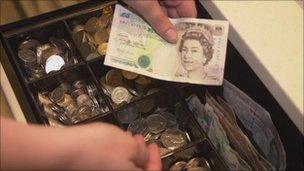VAT 'loophole' to go under review
- Published
Businessmen in Devon and Guernsey on both sides of the argument
The Treasury has told the BBC it is actively reviewing the operation of a tax relief blamed for forcing small UK internet retailers to close.
Low Value Consignment Relief allows goods under £18 in value to be sent VAT-free to the UK from outside the EU.
It has led firms such as HMV, Tesco and Amazon to open big warehouse operations on the Channel Islands.
The Treasury says it is, in effect, looking into whether it would be economical and practical to end LVCR.
Chris Holgate, owner of Devon-based stationers Refresh Cartridges, says the relief makes its incredibly difficult for him to compete with businesses who distribute their products from the Channel Islands.
"If you are looking at making a mark-up of a couple of percent on a product, having someone given a 20% advantage instantly makes it very difficult to compete," he says.
About 70% of the company's turnover comes from web sales and Chris Holgate says that unless the relief is abolished, he, too, will be forced to lay of his dozen staff and move to the Channel Islands.
"It's very difficult to grow a business when you are being handcuffed in such a fashion by the government. It seems odd this hasn't been closed down.
"It seems odd that I'm being encouraged to forget the UK-based business and move it abroad. If it isn't closed, then we will have to move off-shore."
'Market distortion'
In order to benefit from the VAT relief, household names such as Tesco, Amazon and HMV as well as many other less well-known companies ship goods from the UK to warehouses on the Channel Islands, break them down into individual customer orders and then post them back to Britain. The whole process is entirely legal.

The VAT-free scheme saves consumers money but threatens small firms
Opponents claim, however, that it is forcing small British internet companies to close and that it costs the Treasury hundreds of millions of pounds each year in lost VAT.
Within the past few days, Richard Allen, from the Retailers Against VAT Abuse Schemes pressure group, has also submitted evidence to the European Commission which he says shows market distortion.
"The Commission are taking it seriously because this is a major distortion of competition within the Common Market where there is supposed to be a level playing field.
"And there certainly is not a level playing field on internet retailing in the UK. It's an internal market - it's supposed to be protected from this type of behaviour."
LCVR was initially introduced to help Channel Island flower growers gain easy access to the UK market, but it is now being exploited by companies selling everything from DVDs to deodorants.
Still, Rodney Brouard, chairman of the Guernsey Bulk Mailers Association, says getting rid of the scheme could be counter-productive.
"First of all, it would cost the British government too much, they would need thousands of extra customs officers to do that, and I don't believe what we are doing here is that harmful - it's been blown completely out of proportion."
While in opposition, the Chancellor, George Osborne, said he was concerned about the VAT scheme and the difficulty it is causing UK companies.
Similarly, Business Secretary Vince Cable, prior to being part of the government, described as "extraordinarily and seriously unwise" the process whereby big supermarkets sell CDs and DVDs through the Channel Islands.
For those small British companies that cannot move to the Channel Islands and consequently fear having to close down, the only acceptable outcome of the Treasury's current review is for the VAT relief to be abolished.
- Published12 December 2010
- Published23 June 2010